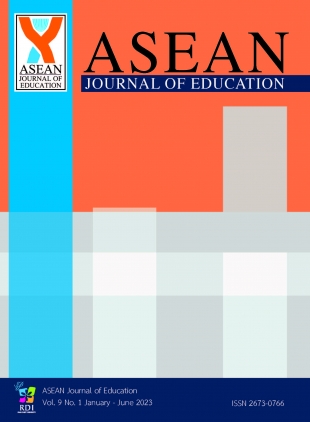Difficulty in Research Subject: A Case of Teacher Education Students at Laguna State Polytechnic University, Sta Cruz Campus
Keywords:
Research difficulty, Instructional material, Undergraduate research subjectAbstract
The study aimed to assess the level of research difficulty of the College of Teacher Education Students in Laguna State Polytechnic University at Sta Cruz Campus as a basis for developing instructional materials in research subject. A mixed method research design was employed in this study wherein descriptive research design was utilized in the quantitative part through weighted mean and standard deviation in assessing their level of research difficulty. Meanwhile, in the qualitative part, students were asked to write their experiences in doing research, their answers were tallied, analyzed, and categorized by theme. Some items in the survey questionnaire were adopted from the research of Morales et al. (2016) and some items were included from the research course syllabus. Participants were selected through purposive sampling. The findings reveal that most of the respondents have a rating of moderately low level of difficulty on almost all items on the self-assessment survey. Students’ found high levels of difficulty in searching for relevant literature on the chosen topic of research ( ̅x = 3.53, SD = 0.93), writing a literature review ( ̅x = 3.51, SD = 0.90) and statistical analysis of data ( ̅ x = 3.43, SD = 0.98). The implication for the research professor is to consider the results in this study and to develop instructional material for the research subject that fit the needs of the students.
References
Commission of Higher Education. (2017). 2017 CHED Memorandum Orders. Retrieved from https://ched.gov.ph/2017-ched-memorandum-orders/
Gacrama, B. I., & Baptista, G. O. (2019). Research Competencies of Undergraduate Faculty in a Private University in Northern Philippines. Salettinian Open Academic Review, 1(1), 1-18.
Garingan, E. G. (2019). Difficulty in Conducting Research and Learning Ability in English among College of Teacher Education Students. American Journal of Educational Research, 7(6), 398-401.
Guilbert, G., Lane, R., & Van Bergen, P. (2015). Understanding student engagement with research: A study of pre-service teachers’ research perceptions, research experience, and motivation. Asia-Pacific Journal of Teacher Education, 44(2), 172–187.
Healey, M., & Jenkins, H. (2009). Developing undergraduate research and inquiry. The Higher Education Academy. Retrieved from https://s3.eu-west-2.amazonaws.com/assets.creode.advancehe-document-manager/documents/hea/private/developingundergraduate_final_1568036694.pdf
Katsarou, E., & Tsafos, V. (2013). Student-teachers as researchers: towards a professional development orientation in teacher education. Possibilities and limitations in the Greek university. Educational Action Research, 21(4), 532–548.
Oolbekkink-Marchand, H., Oosterheert, I., Lubberink, L. S., & Denessen, E. (2022). The position of student teacherpractitioner research in teacher education: teacher educators’ perspectives, Educational Action Research, 30(3), 445-461.
Meagher, P. (2017). A Theory of Difficulty. Retrieved from https://www.newyorkinvestmentnetwork.com/blog/2017/8/15/a-theory-of-difficulty
Morales, M. P. E., Abulon, E. L. R., Soriano, P. R., David, A. P., Hermosisima, Ma. V. C., & Gerundio, M. G. (2016). Examining teachers’ conception of and needs on action research. Issues in Educational Research, 26(3), 464-489.
Pearce, E., Brock, J., & Bunch, P. (2022). Effects of an Undergraduate Research Experience on Pre-Service Teachers’ Perceptions. Journal of Educational Research & Practice, 12(1), 18–35.
Perkins, D. (2007). Theories of difficulty. In N. Entwistle & P. Tomlinson (Eds.), Student learning and university teaching (pp. 31–48). British Psychological Society.
Petrella, J. K., & Jung, A. P. (2008). Undergraduate Research: Importance, Benefits, and Challenges. International Journal of Exercise Science, 1(3), 91-95.
Polit, D. F., & Beck, C. T. (2017). Nursing research: Generating and assessing evidence for nursing practice (10th ed.). Philadelphia, PA: Wolters Kluwer/Lippincott Williams & Wilkins.
Postholm, M. (2009). Research and development work: developing teachers as researchers or just teachers?. Educational Action Research, 17(4), 551-565.
Sumbawati, M. S., & Anistyasari, Y. (2018). The impact of research-based learning on students’ academic performance and motivation. IOP Conf. Ser.: Mater. Sci. Eng. 296 012043. Retrieved from https://iopscience.iop.org/article/10.1088/1757-899X/296/1/012043
Tashakkori, A., & Newman, I. (2010). Mixed Methods in International Encyclopedia of Education (Third Edition). Retrieved from https://www.sciencedirect.com/topics/psychology/mixed-methods
Tan, E. B. (2007). Research Experiences of Undergraduate Students at a Comprehensive University. International Journal of Teaching and Learning in Higher Education, 19(3), 205-215.
Tigelaar, D. E. H., & Tartwijk, J. V. (2010). The evaluation of prospective teachers in teacher education. In Peterson P., Baker E., McGaw B. (Eds.), International encyclopedia of education (3rd ed., pp. 7:512–77:517). Elsevier. https://doi.org/10.1016/B978-0-08-044894-7.00647-3
Tillema, H. (2010). Formative Assessment in Teacher Education and Teacher Professional Development International Encyclopedia of Education (Third Edition). Retrieved from https://www.sciencedirect.com/topics/psychology/self-assessments
Tolentino, K. S. (2021). The Research Capability of Secondary School Science Teachers. International Journal of Multidisciplinary: Applied Business and Education Research, 2(3), 213-224.
Walkington, H. (2015). Students as researchers: Supporting undergraduate research in the disciplines in higher education. The Higher Education Academy. Retrieved from https://www.heacademy.ac.uk/sites/default/files/resources/Students%20as%20researchers_1.pdf
Downloads
Published
How to Cite
Issue
Section
License

This work is licensed under a Creative Commons Attribution-NonCommercial-NoDerivatives 4.0 International License.
1 All articles will undergo a formal peer-review. A panel of experts from within or without the university will examine the article; approval from a minimum of two experts is required for publication. Revisions posed by the experts must be completed by the research prior to publication.
2 Once published in the ASEAN Journal of Education, the article becomes intellectual property of Suan Dusit University. Duplication, in full or part, requires permission from Suan Dusit University.
3 Excluding errors incurred during printing, author(s) are responsible for the content of their articles.






